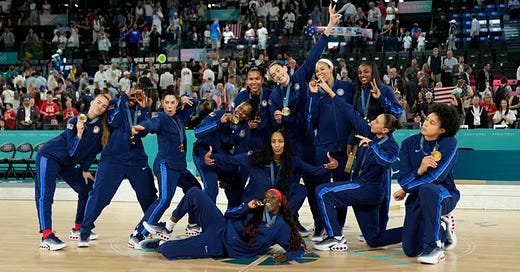Five Out: Team USA's Gold Medal Run, Angel Reese the fashion mogul and the WNBA is back!
What are the lessons of the 2024 Olympics in women's basketball? And what can we expect in the stretch run of the W season? Our WBB column for the week of August 12, 2024.
Well, that was a lovely two weeks. I could write thousands of words about how The Gold Zone and NBC’s programming and app design saved the Olympics but maybe that’s for another outlet at another time. All I’ll say is that I hope that viewing experience comes back for the winter games because if you haven’t seen d…
Keep reading with a 7-day free trial
Subscribe to No Cap Space WBB to keep reading this post and get 7 days of free access to the full post archives.




